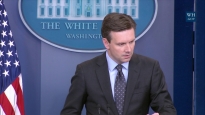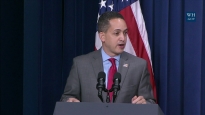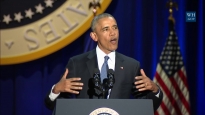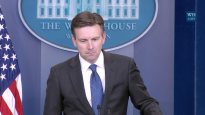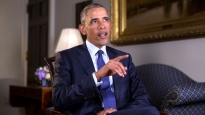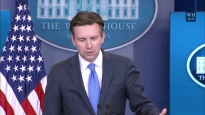President Obama’s Third Annual Back to School Speech
September 28, 2011 | 22:09 | Public Domain
Tells America’s High School Students that They Are America’s Future.
Remarks by the President in Back-to-School Speech
Benjamin Banneker High School
Washington, D.C.
1:48 P.M. EDT
THE PRESIDENT: Thank you. (Applause.) Thank you very much. Everybody, please have a seat. Well, Madam President, that was an outstanding introduction. (Laughter.) We are so proud of Donae for representing this school so well.
And in addition, I also want to acknowledge your outstanding principal, who has been here for 20 years -- first as a teacher, now as an outstanding principal -- Anita Berger. Please give her a big round of applause. (Applause.) I want to acknowledge, as well, Mayor Gray is here -- the mayor of Washington, D.C. is here. Please give him a big round of applause. (Applause.) And I also want to thank somebody who is going to go down in history as one of the finest Secretaries of Education that we’ve ever had -- Arne Duncan is here. (Applause.)
Now, it is great to be here at Benjamin Banneker High School, one of the best high schools not only in Washington, D.C., but one of the best high schools in the country. (Applause.) But we’ve also got students tuning in from all across America. And so I want to welcome you all to the new school year, although I know that many of you already have been in school for a while. I know that here at Banneker, you’ve been back at school for a few weeks now. So everything is starting to settle in, just like for all your peers all across the country. The fall sports season is underway. Musicals and marching band routines are starting to shape up, I believe. And your first big tests and projects are probably just around the corner.
I know that you’ve also got a great deal going on outside of school. Your circle of friends might be changing a little bit. Issues that used to stay confined to hallways or locker rooms are now finding their way onto Facebook and Twitter. (Laughter.) Some of your families might also be feeling the strain of the economy. As many of you know, we’re going through one of the toughest economic times that we’ve gone through in our lifetime -- in my lifetime. Your lifetime hasn’t been that long. And so, as a consequence, you might have to pick up an after-school job to help out your family, or maybe you’re babysitting for a younger sibling because mom or dad is working an extra shift.
So all of you have a lot on your plates. You guys are growing up faster and interacting with a wider world in a way that old folks like me, frankly, just didn’t have to. So today, I don’t want to be just another adult who stands up and lectures you like you’re just kids -- because you’re not just kids. You’re this country’s future. You’re young leaders. And whether we fall behind or race ahead as a nation is going to depend in large part on you. So I want to talk to you a little bit about meeting that responsibility.
It starts, obviously, with being the best student that you can be. Now, that doesn’t always mean that you have to have a perfect score on every assignment. It doesn’t mean that you’ve got to get straight As all the time -- although that’s not a bad goal to have. It means that you have to stay at it. You have to be determined and you have to persevere. It means you’ve got to work as hard as you know how to work. And it means that you’ve got to take some risks once in a while. You can’t avoid the class that you think might be hard because you’re worried about getting the best grade if that’s a subject that you think you need to prepare you for your future. You’ve got to wonder. You’ve got to question. You’ve got to explore. And every once in a while, you need to color outside of the lines.
That’s what school is for: discovering new passions, acquiring new skills, making use of this incredible time that you have to prepare yourself and give yourself the skills that you’re going to need to pursue the kind of careers that you want. And that’s why when you’re still a student you can explore a wide range of possibilities. One hour you can be an artist; the next, an author; the next, a scientist, or a historian, or a carpenter. This is the time where you can try out new interests and test new ideas. And the more you do, the sooner you’ll figure out what makes you come alive, what stirs you, what makes you excited -- the career that you want to pursue.
Now, if you promise not to tell anybody, I will let you in on a little secret: I was not always the very best student that I could be when I was in high school, and certainly not when I was in middle school. I did not love every class I took. I wasn’t always paying attention the way I should have. I remember when I was in 8th grade I had to take a class called ethics. Now, ethics is about right and wrong, but if you’d ask me what my favorite subject was back in 8th grade, it was basketball. I don’t think ethics would have made it on the list.
But here’s the interesting thing. I still remember that ethics class, all these years later. I remember the way it made me think. I remember being asked questions like: What matters in life? Or, what does it mean to treat other people with dignity and respect? What does it mean to live in a diverse nation, where not everybody looks like you do, or thinks like you do, or comes from the same neighborhood as you do? How do we figure out how to get along?
Each of these questions led to new questions. And I didn’t always know the right answers, but those discussions and that process of discovery -- those things have lasted. Those things are still with me today. Every day, I’m thinking about those same issues as I try to lead this nation. I’m asking the same kinds of questions about, how do we as a diverse nation come together to achieve what we need to achieve? How do we make sure that every single person is treated with dignity and respect? What responsibilities do we have to people who are less fortunate than we are? How do we make sure that everybody is included in this family of Americans?
Those are all questions that date back to this class that I took back in 8th grade. And here’s the thing: I still don’t always know the answers to all these questions. But if I’d have just tuned out because the class sounded boring, I might have missed out on something that not only did I turn out enjoying, but has ended up serving me in good stead for the rest of my life.
So that’s a big part of your responsibility, is to test things out. Take risks. Try new things. Work hard. Don’t be embarrassed if you’re not good at something right away. You’re not supposed to be good at everything right away. That’s why you’re in school. The idea, though, is, is that you keep on expanding your horizons and your sense of possibility. Now is the time for you to do that. And those are also, by the way, the things that will make school more fun.
Down the road, those will be the traits that will help you succeed, as well -- the traits that will lead you to invent a device that makes an iPad look like a stone tablet. Or what will help you figure out a way to use the sun and the wind to power a city and give us new energy sources that are less polluting. Or maybe you’ll write the next great American novel.
Now, to do almost any of those things, you have to not only graduate from high school, -- and I know I’m just -- I’m in the "amen" corner with Principal Berger here -- not only do you have to graduate from high school, but you’re going to have to continue education after you leave. You have to not only graduate, but you’ve got to keep going after you graduate.
That might mean, for many of you, a four-year university. I was just talking to Donae, and she wants to be an architect, and she’s interning with a architectural firm, and she’s already got her sights set on what school she wants to go to. But it might, for some other folks, be a community college, or professional credentialing or training. But the fact of the matter is, is that more than 60 percent of the jobs in the next decade will require more than a high school diploma -- more than 60 percent. That’s the world you’re walking into.
So I want all of you to set a goal to continue your education after you graduate. And if that means college for you, just getting into college is not enough. You also have to graduate. One of the biggest challenges we have right now is that too many of our young people enroll in college but don’t actually end up getting their degree, and as a consequence -- our country used to have the world’s highest proportion of young people with a college degree; we now rank 16th. I don't like being 16th. I like being number one. That’s not good enough. So we’ve got to use -- we’ve got to make sure your generation gets us back to the top of having the most college graduates relative to the population of any country on Earth.
If we do that, you guys will have a brighter future. And so will America. We’ll be able to make sure the newest inventions and the latest breakthroughs happen right here in the United States of America. It will mean better jobs, and more fulfilling lives, and greater opportunities not only for you, but also for your kids.
So I don’t want anybody who’s listening here today to think that you’re done once you finish high school. You are not done learning. In fact, what’s happening in today’s economy is -- it’s all about lifelong learning. You have to constantly upgrade your skills and find new ways of doing things. Even if college isn't for you, even if a four-year college isn't for you, you’re still going to have to get more education after you get out of high school. You’ve got to start expecting big things from yourself right now.
I know that may sound a little intimidating. And some of you may be wondering how you can pay for college, or you might not know what you want to do with your life yet. And that’s okay. Nobody expects you to have your entire future mapped out at this point. And we don't expect you to have to make it on your own. First of all, you’ve got wonderful parents who love you to death and want you to have a lot more opportunity than they ever had -- which, by the way, means don’t give them a hard time when they ask you to turn off the video games, turn off the TV and do some homework. You need to be listening to them. I speak from experience because that’s what I’ve been telling Malia and Sasha. Don’t be mad about it, because we’re thinking about your future.
You’ve also got people all across this country -- including myself and Arne and people at every level of government -- who are working on your behalf. We’re taking every step we can to ensure that you’re getting an educational system that is worthy of your potential. We’re working to make sure that you have the most up-to-date schools with the latest tools of learning. We’re making sure that this country’s colleges and universities are affordable and accessible to you. We’re working to get the best class -- teachers into the classroom as well, so they can help you prepare for college and a future career.
Let me say something about teachers, by the way. Teachers are the men and women who might be working harder than just about anybody these days. (Applause.) Whether you go to a big school or a small one, whether you attend a public or a private or charter school –- your teachers are giving up their weekends; they’re waking up at dawn; they’re cramming their days full of classes and extra-curricular activities. And then they’re going home, eating some dinner, and then they’ve got to stay up sometimes past midnight, grading your papers and correcting your grammar, and making sure you got that algebra formula properly.
And they don’t do it for a fancy office. They don’t -- they sure don’t do it for the big salary. They do it for you. They do it because nothing gives them more satisfaction than seeing you learn. They live for those moments when something clicks; when you amaze them with your intellect or your vocabulary, or they see what kind of person you’re becoming. And they’re proud of you. And they say, I had something to do with that, that wonderful young person who is going to succeed. They have confidence in you that you will be citizens and leaders who take us into tomorrow. They know you’re our future. So your teachers are pouring everything they got into you, and they’re not alone.
But I also want to emphasize this: With all the challenges that our country is facing right now, we don’t just need you for the future; we actually need you now. America needs young people’s passion and their ideas. We need your energy right now. I know you’re up to it because I’ve seen it. Nothing inspires me more than knowing that young people all across the country are already making their marks. They’re not waiting. They’re making a difference now.
There are students like Will Kim from Fremont, California, who launched a nonprofit that gives loans to students from low-income schools who want to start their own business. Think about that. So he’s giving loans to other students. He set up a non-for-profit. He’s raising the money doing what he loves -- through dodgeball tournaments and capture-the-flag games. But he’s creative. He took initiative. And now he’s helping other young people be able to afford the schooling that they need.
There is a young man, Jake Bernstein, 17 years old, from a military family in St. Louis, worked with his sister to launch a website devoted to community service for young people. And they’ve held volunteer fairs and put up an online database, and helped thousands of families to find volunteer opportunities ranging from maintaining nature trails to serving at local hospitals.
And then last year, I met a young woman named Amy Chyao from Richardson, Texas. She’s 16 years old, so she’s the age of some of you here. During the summer, I think because somebody in her family had an illness, she decided that she was interested in cancer research. She hadn’t taken chemistry yet, so she taught herself chemistry during the summer. And then she applied what she had learned and discovered a breakthrough process that uses light to kill cancer cells. Sixteen years old. It’s incredible. And she's been approached by some doctors and researchers who want to work with her to help her with her discovery.
The point is you don’t have to wait to make a difference. You’re first obligation is to do well in school. You’re first obligation is to make sure that you’re preparing yourself for college and career. But you can also start making your mark right now. A lot of times young people may have better ideas than us old people do anyway. We just need those ideas out in the open, in and out of the classroom.
When I meet young people like yourselves, when I sat and talk to Donae, I have no doubt that America’s best days are still ahead of us, because I know the potential that lies in each of you. Soon enough, you will be the ones leading our businesses and leading our government. You will be the one who are making sure that the next generation gets what they need to succeed. You will be the ones that are charting the course of our unwritten history. And all that starts right now -- starts this year.
So I want all of you who are listening, as well as everybody here at Banneker, I want you to make the most of the year that’s ahead of you. I want you to think of this time as one in which you are just loading up with information and skills, and you’re trying new things and you’re practicing, and you’re honing -- all those things that you’re going to need to do great things when you get out of school.
Your country is depending on you. So set your sights high. Have a great school year. Let’s get to work.
Thank you very much, everybody. God bless you. God bless the United States of America. (Applause.)
END
2:06 P.M. EDT
|
January 12, 2017
|
January 12, 2017
|
January 11, 2017
|
January 11, 2017
|
|
January 11, 2017
|
January 9, 2017
|
January 7, 2017
|
January 6, 2017
|
- &lsaquo previous
- 1
- 2
- 3
- 4
- 5
- 6
- 7
- 8
- 9
- …
- next &rsaquo

